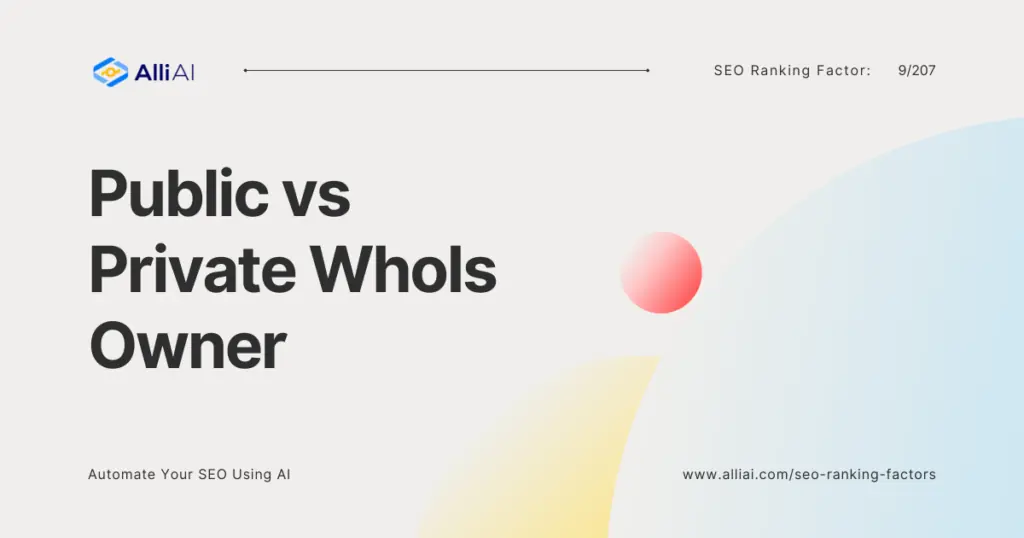Explanation of Public vs Private WhoIs Owner
When a domain is registered, the registrant’s personal information, including their name, address, phone number, and email, is required. This information becomes part of the WHOIS database, a public record accessible by anyone. Choosing public WHOIS means that this personal information is available to anyone who wishes to see it. On the flip side, opting for private WHOIS (also known as WHOIS protection) means that a proxy or privacy service’s information is displayed instead, keeping the registrant’s personal information confidential.
Think of WHOIS as a phone book. If your number is listed publicly, anyone can find your contact info. Public WHOIS is similar; your domain’s contact info is available to anyone curious enough to look it up. Opting for private WHOIS is like having an unlisted number; the phone company knows who you are, but your information isn’t publicly available.
Why is Public vs Private WhoIs Owner Important in SEO?
The selection between public and private WHOIS can impact trust and transparency with search engines like Google. While Google has never explicitly stated that WHOIS privacy affects rankings, the broader SEO community has debated this issue. Some argue that transparent ownership might influence the perceived trustworthiness of a site, affecting its rankings indirectly.
How Public vs Private WhoIs Owner Affects SEO
The implications of WHOIS visibility on SEO are nuanced and largely speculative; however, the consensus leans towards transparency being beneficial in building trust with both users and search engines.
1. Transparency and Trust
A 2017 study by Moz suggested that transparency in domain ownership could contribute to a website’s overall trust signals. Although not a direct ranking factor, sites that maintain open information might be perceived as more legitimate, potentially affecting their SEO performance. Trustworthy sites often attract more clicks and engagement, which are indirect signals to search engines about the site’s value.
2. Spam and Malicious Sites
Google’s efforts to combat spam and malicious websites are well-documented. Domains with private WHOIS information are sometimes viewed with suspicion since illegitimate sites often hide their ownership. However, this is not a hard rule, as many legitimate websites also opt for privacy for valid reasons. Therefore, while private WHOIS might raise a red flag, it is usually the overall quality and behavior of the site that matters more.
The Trust Factor: A Multifaceted Equation
Trust, in the context of SEO, is a multifaceted concept. It’s not just about whether your WHOIS information is public or private. Search engines evaluate numerous signals to gauge a website’s trustworthiness, including:
- SSL Certificates: Secure Sockets Layer (SSL) certificates encrypt data transmitted between a website and its users, ensuring a safe browsing experience.
- Quality Content: Websites that consistently publish high-quality, informative, and engaging content are seen as more authoritative and trustworthy.
- User Reviews and Ratings: Positive feedback from users on platforms like Google My Business or Yelp can boost a website’s reputation and trustworthiness.
- Backlink Profile: The quality and quantity of backlinks from other reputable websites play a significant role in establishing a website’s authority and credibility.
While WHOIS transparency can contribute to this trust equation, it’s not the sole determinant. A website with private WHOIS can still rank well if it excels in other areas of trust and SEO optimization.
The Debate Continues: Navigating the Gray Areas
The question of whether to use public or private WHOIS doesn’t have a one-size-fits-all answer. It depends on various factors, including your website’s purpose, target audience, and personal preferences.
For businesses that prioritize transparency and want to establish themselves as reputable entities, public WHOIS might be the preferred choice. This is especially true for e-commerce sites, news organizations, and other websites that rely heavily on user trust.
On the other hand, individuals, small businesses, and those who prioritize privacy might opt for private WHOIS to protect their personal information from spammers and potential threats.
It’s crucial to weigh the pros and cons of each option and choose the one that aligns with your specific needs and goals.
FAQ
How Does Google View Private WHOIS Information?
While Google has not explicitly confirmed that private WHOIS affects search rankings, the emphasis is on quality and trust. If a site is high-quality and serves valuable content, private WHOIS is unlikely to have a negative impact.
Can Private WHOIS Affect My Site’s Ability to Rank?
Not directly. SEO rankings are determined by many factors, primarily site content, user experience, and backlink profile. However, in competitive niches, every little trust signal, including WHOIS transparency, may contribute to the overall authority and trustworthiness of your site.
Is it Worth Opting for Private WHOIS?
Consider your privacy needs and business goals. If you receive a lot of spam or wish to protect your personal information, private WHOIS may be beneficial. However, if you aim to establish your website as a transparent and trustworthy authority, keeping your WHOIS public could contribute positively to your site’s perception.
Conclusion
The debate between public vs private WHOIS ownership and its impact on SEO encapsulates a broader discussion about transparency and trust online. While private WHOIS is undoubtedly valuable for personal privacy, public WHOIS might slightly edge out in terms of fostering trust with your audience and possibly search engines. However, the most critical factors for SEO success remain high-quality content, a great user experience, and a robust backlink profile. Whatever your choice regarding WHOIS privacy, ensure that your primary focus is on delivering value to your audience, as this is the surest path to SEO success.






